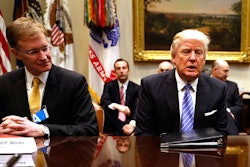An effort by House Republicans to overhaul the U.S. tax system relies on a controversial change that analysts believe could impact consumers and businesses alike.
Reports in recent days detailed what's known as "border adjustment," which prohibits deducting imports as business costs but exempts exports.
Supporters in Congress view the change as a way to generate some $1 trillion in revenue over 10 years and fund reductions in individual and corporate tax rates.
The plan could also benefit exporters, as well as manufacturers that compete with foreign firms.
But the proposal could hurt businesses that rely on imports. The Wall Street Journal suggested that small businesses, which often lack the capability to manufacture in the U.S., could be forced to cut jobs or cease operations entirely due to a significantly higher tax bill.
CNBC also reports that consumers could pay more for electronics, apparel and even gasoline.
Proponents believe that the tweak would increase the value of the dollar enough to offset higher costs for imports, but currency changes would present other problems.
A strong dollar makes U.S. goods more expensive in foreign markets and tends to exacerbate trade deficits — and hinder domestic manufacturing.
CNBC noted that Wall Street appears skeptical about the plan's prospects for passage through Congress, particularly as prominent companies line up in opposition and as Trump administration officials consider the dollar to already be too strong.
The Journal, however, suggested that the White House could support a package with border adjustment if it provides funds for a massive, expensive wall along the border with Mexico.
And House Republicans appear largely on board despite the potential problems.
"This is a once-in-a-generation opportunity," Rep. Tom Reed, R-N.Y., told the paper. "If we don’t take care of everybody, you’re not going to have an opportunity to do it down the road."






















